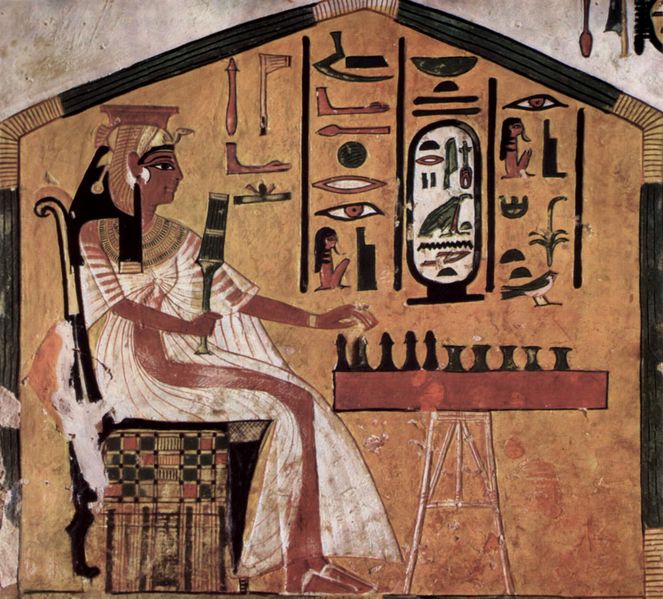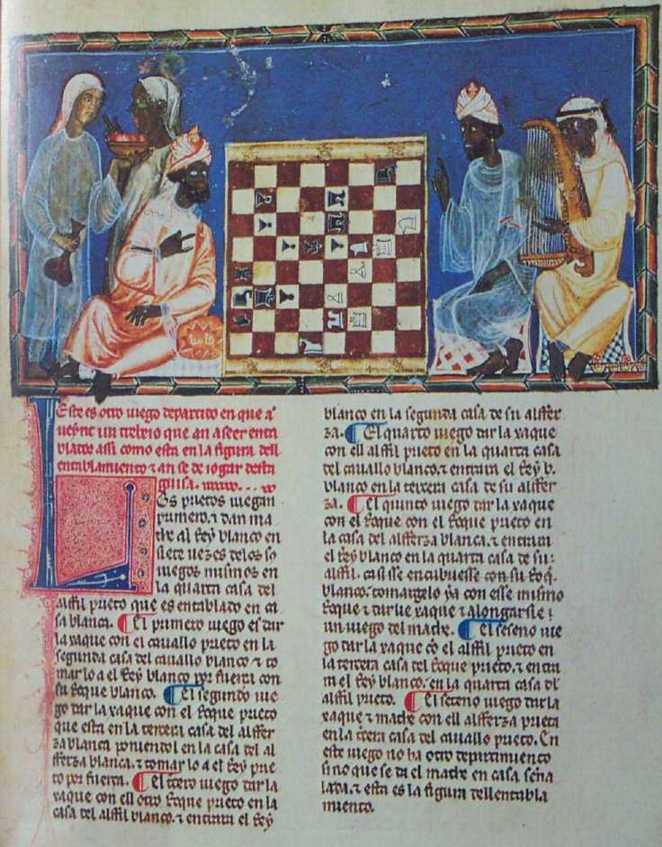Post by homeylu on May 15, 2010 16:08:58 GMT -5
Board games typically require intense cognitive abilities, keen awareness, complex calculating abilities and acute memory. These are not qualities attained by individuals with low intelligence. In fact some games requires such strategic moves to undermine the opponent, that a certain level of psychosocial awareness appears to be a key element to possess as well. Here we will explore the history of board games which have their roots on the African continent.
3500 B.C., the earliest recorded evidence of board games comes from the Ancient Egyptian named Senet, zn.t n.t b meaning the "game of passing."
Queen Nefatari playing the game of zn.t

Copies of senet games have been found in predynastic burials in AE, making it possibly one of the oldest board games known.
![]()
upload.wikimedia.org/wikipedia/commons/thumb/f/fb/P9210016.JPG/448px-P9210016.JPG[/img]
A board game dated to around 400 B.C. found in Qustul, Nubia, made of wood and included 15 ebony and ivory pieces and a dice rolling box, possibly the predecessor to today’s backgammon.

Evidence of chest being played by the African Moors from the Book of Games, as noted by the evidence above board games were invented in Africa long before their introduction to Europe by the Moors and Arabs.

Mancala is a number of strategic games with roots in Africa, reported expanding back 7000 years, however the earliest recorded evidence found by archaeologists in Aksumite Ethiopia in Matara (now in Eritrea) and Yeha (in Ethiopia), dating back to between 500 and 700 AD. Stone Mancala boards have been found carved into the roofs of temples in Memphis, Thebes and Luxor - the game was definitely being played in Egypt before 1400BC.
Aweet , a complex counting game played in Sudan
“Players first place an equal number of seeds (the number varies by the specific game being played) in each of the pits on the game board. On a turn, a player removes all of the seeds in one pit and then deposits them, one at a time, in the following pits, including one pit at each end of the board where the seeds are "captured" by the player who controls that particular pit. At the end of the game, the player who has captured the most seeds is the winner.”

Wooden Mancala board found in West Africa

Evidence of Mancala found on stella in Aksumite Kingdom

Modern Macala game board

Internationally renowned Okare Mancala game from Ghana

Omwesa, a mancala game popular in Uganda

Sri Lanka form of the Ancient African game adoped by popular culture.

Learn more about African games here.
3500 B.C., the earliest recorded evidence of board games comes from the Ancient Egyptian named Senet, zn.t n.t b meaning the "game of passing."
Queen Nefatari playing the game of zn.t

Copies of senet games have been found in predynastic burials in AE, making it possibly one of the oldest board games known.
upload.wikimedia.org/wikipedia/commons/thumb/f/fb/P9210016.JPG/448px-P9210016.JPG[/img]
A board game dated to around 400 B.C. found in Qustul, Nubia, made of wood and included 15 ebony and ivory pieces and a dice rolling box, possibly the predecessor to today’s backgammon.

Evidence of chest being played by the African Moors from the Book of Games, as noted by the evidence above board games were invented in Africa long before their introduction to Europe by the Moors and Arabs.

Mancala is a number of strategic games with roots in Africa, reported expanding back 7000 years, however the earliest recorded evidence found by archaeologists in Aksumite Ethiopia in Matara (now in Eritrea) and Yeha (in Ethiopia), dating back to between 500 and 700 AD. Stone Mancala boards have been found carved into the roofs of temples in Memphis, Thebes and Luxor - the game was definitely being played in Egypt before 1400BC.
Aweet , a complex counting game played in Sudan
“Players first place an equal number of seeds (the number varies by the specific game being played) in each of the pits on the game board. On a turn, a player removes all of the seeds in one pit and then deposits them, one at a time, in the following pits, including one pit at each end of the board where the seeds are "captured" by the player who controls that particular pit. At the end of the game, the player who has captured the most seeds is the winner.”

Wooden Mancala board found in West Africa
Evidence of Mancala found on stella in Aksumite Kingdom

Modern Macala game board

Internationally renowned Okare Mancala game from Ghana

Omwesa, a mancala game popular in Uganda

Sri Lanka form of the Ancient African game adoped by popular culture.

Learn more about African games here.

